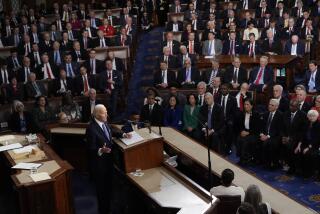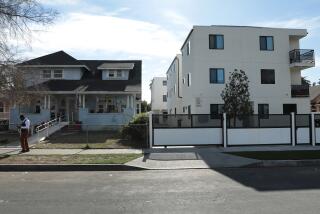Newton: Getting L.A. growing again
There is no more consistent refrain among elected officials and candidates these days than that they will do everything they can to create jobs. It’s a worthy goal given the sluggish state of the economy, and it’s particularly crucial in California, which has the third-highest unemployment rate in the nation (behind Nevada and Rhode Island).
But putting people to work is a lot easier to talk about than it is to do. Government budgets at all levels are tight, so any thought of launching large-scale public works projects runs up against depleted revenue; there are no Hoover Dams in the works. Politicians bicker over which ideas are most worthy. Neighborhoods resist projects that would be good for the region but impose a burden on specific communities.
Does that mean that Los Angeles, which has lost about 30,000 jobs since 1995, is destined to continue shedding them? Or are there tools the government could use to spur local job growth quickly without deepening the shortfalls of the city, county or state governments?
Those were the questions I posed to a wide range of influential Californians in recent days. They included business leaders — Russell Goldsmith, chairman of City National Bank, and AEG President Tim Leiweke. There were current and former public officials — Los Angeles Councilman Eric Garcetti, L.A. County Supervisor Mark Ridley-Thomas, former U.S. Secretary of Labor Robert Reich, Lt. Gov. Gavin Newsom and former L.A. Mayor Richard Riordan. And there were passionate advocates on opposite sides of big issues — Carol Schatz, president of the Central City Assn., and Maria Elena Durazo, secretary-treasurer of the Los Angeles County Federation of Labor.
Naturally, these people disagreed on plenty. But what was most striking is that, despite their range of vantage points and political leanings, they identified many of the same opportunities for growth. From them emerged a coherent and workable plan for putting people in this area back to work, sooner rather than later. Here are some of their ideas:
Accelerate local rail projects
Many of those I talked to, including Durazo and Goldsmith, applauded the transportation bill that Mayor Antonio Villaraigosa recently helped push through Congress. Goldsmith, who chairs the Los Angeles Coalition for the Economy and Jobs, noted that construction of some of the projects could begin almost immediately and could provide a significant infusion of jobs, both in construction and in long-term employment created by new economic activity.
“We’re seeing progress like we rarely see in this city,” Goldsmith said of the opportunities created by the transportation bill. And though accelerating the region’s ambitious set of transportation projects to complete them in a decade will require voter approval to extend an existing half-cent sales tax, Goldsmith and others said the combination of federal support and local funding offers the chance to significantly increase employment. (The coalition’s report on jobs is available at https://www.thelacoalition.com/site/resources.php).
Ridley-Thomas highlighted transportation as the most important infrastructure undertaking of local governments, noting that it can provide both traffic relief and opportunities to put people to work.
Expand the airport and port
No single project attracted broader and more enthusiastic support from those I spoke to than revitalizing LAX, which would both create immediate construction jobs and help local industries and businesses over the long run. Step one would be to move the north runway, which would enhance safety, make room for larger planes and clear the way for renovation of more terminals. An airport that Schatz described hyperbolically as “Third World” could be transformed into something that presents tourists with an inviting first look at Los Angeles. Leiweke in particular emphasized the importance of that project, which he said should anchor a broader regional commitment to expanding L.A.’s tourism and convention business. Durazo, who disagrees with Schatz about most things, agrees with her on this.
The port also brims with opportunities for job-producing expansion. A proposed rail loading yard near the port has hung in limbo for more than seven years, in part because of Villaraigosa’s unwillingness to take a firm stand. Approving it would create construction jobs right away and, by speeding commerce through the port, exponentially add to the workforce in Southern California. All this one takes is a yes from the mayor and a willingness to overrule the objections of a few neighbors and some misguided environmental objections.
Change laws that depress job creation
Former Mayor Riordan, along with Goldsmith and a few others, suggested that California’s environmental protection laws are too restrictive. They propose not to gut them but rather to speed up the legal process and limit who can sue to block projects. Riordan and Garcetti — a business-oriented Republican and a liberal Democrat, respectively — think the city and state should lower business taxes and make them more rational.
Garcetti sees a number of opportunities for the city government too. He divided his job-creation ideas into three categories: aiding small-business growth, reforming city taxes and identifying key industries to lure to Los Angeles.
On taxes, he echoed Riordan’s concern that the gross receipts tax discourages business and costs the city more than it raises. The tax, which skims a small percentage off every business sale, has helped to chase away 95 car dealerships since the Los Angeles riots in 1992. The return of just five of those dealerships would make up in sales taxes all that the city has lost in gross receipts taxes. Garcetti sponsored legislation, signed by Villaraigosa, to suspend those taxes for car dealerships.
Next up: Garcetti is preparing to urge the City Council to abolish the tax. Swift council action, he says, would create jobs.
Durazo suggested some work for the Legislature. After the abolition of community redevelopment last year, she argued that legislation was needed to restore the ability of cities to encourage development. Senate President Pro Tem Darrell Steinberg (D-Sacramento) is carrying a bill that would do that, and Durazo urged lawmakers to act on it.
Newsom, who is spearheading job creation from Sacramento and also owns a number of private businesses, agrees that there’s room for state action, but he makes the point that changes need to happen at a “granular level” to combat the state’s reputation as anti-business. Like Riordan, he argued that too many local agencies move slowly and that they instead should push to speed up the issuing of permits, streamline applications and allow businesses to file just one set of documents that could be shared by the city, county and state. “If we start changing attitudes … we can start turning the corner,” he said.
Leverage purchasing power
Although Durazo and the business leaders agree on the need to modernize LAX and expand the capacity of the port, they part ways on some issues. Durazo, for instance, wants to see government agencies such as the MTA use their purchasing power to favor suppliers who make products here, reestablishing a manufacturing base that has been badly battered in recent years. Ridley-Thomas agrees. Leiweke, however, is skeptical that L.A. can again be a manufacturing center. Those jobs are gone, he argues, and pouring resources into trying to bring them back distracts from more promising industries, such as tourism.
Get federal help
Many projects that could help turn around the local economy can be handled locally. But, as Reich and others said, the federal government also has a role to play. One area where federal intervention could help is in mortgage relief. “Far too many people are under water” on their mortgages, Reich noted. Moreover, Washington could directly stimulate job growth in California by helping state and local governments, as well as school districts, rehire workers they’ve been forced to lay off to balance budgets. Those workers would start spending and paying taxes again, he said, providing “a major shot in the arm.”
Hold the private sector responsible too
Finally, there is a piece of the puzzle emphasized by both Durazo and Riordan that I’ll call, for lack of a better term, moral responsibility. As the profits of private employers rebound, all too many of them are hoarding money rather than putting people back to work. Business leaders who complain about government inaction but refuse to use their money to create jobs share in the blame for this slow recovery. Banks need to lend, and businesses need to hire. Without those, the recovery will drag on and the suffering will continue.
What these leaders make clear is that job creation isn’t simple, but it’s possible. Clear thinking and focused effort can put people back to work. The open question is whether Los Angeles leaders can muster the focus and political will to act.
Jim Newton’s column appears Mondays. His latest book is “Eisenhower: The White House Years.” Reach him at jim.newton@latimes.com or follow him on Twitter: @newton_jim.
More to Read
A cure for the common opinion
Get thought-provoking perspectives with our weekly newsletter.
You may occasionally receive promotional content from the Los Angeles Times.






